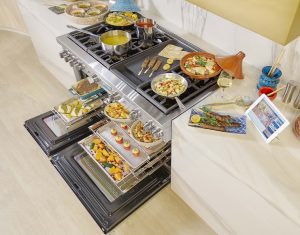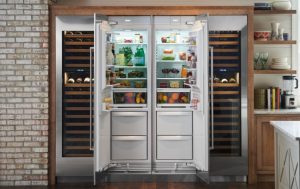Five Great Ways to Save Energy in Your Kitchen

Many homeowners are concerned with having a greener home, and when it comes to saving energy, the kitchen is one of the most important areas to concentrate your efforts. Your kitchen is likely to be in use throughout the day, with appliances to make our lives easier. So, here are five great ways to save energy without compromising your kitchen functionality.
Upgrade Your Cooktop to Induction
Induction technology magnets to conduct heat through your cooking vessel directly. This differs from conventional cooktops that use thermal conduction to focus the heat on the cooktop burner.In simple terms, magnetic induction features a coil mounted under the cooking surface of each burner. This generates a magnetic field that is turned on when you turn on the stove. As you place a ferromagnetic pot or pan on the burner, heat is delivered directly to the cookware. This provides a more concentrated heat, where there is no heat loss from escape as you would find with a traditional burner.
According to Department of Energy statistics, induction cooktops can save a great deal of energy as they are 12% more efficient compared to a smooth top electric range or cooktop at heating food. While they tend to be more costly initially and you cannot use Teflon pans, induction cooktops offer considerable energy savings in the long term.
Update and Stock Your Refrigerator
Refrigerators are at the top of the list of most energy-using appliances in the typical home. This is because your refrigerator is continuously running to keep your food cold. According to Energy Star, an outdated refrigerator needs to be retired as soon as possible as this continuous usage causes wear and it could be causing excessive energy consumption.
It is also essential to keep your refrigerator stocked. While you don’t want to overcrowd your refrigerator, the more empty space, the harder your refrigerator will need to work to cool it.
Practice Dishwasher Efficiency
Dishwashers are considered a standard in most American kitchens, but they can also be a big energy consumer. This means that you need to practice dishwasher efficiency. Fortunately, most modern dishwashers are designed to use as little water and energy as possible, but you still need to make good dishwasher choices. Don’t use the same wash program for every load, but tailor it to the soil level and volume. This will not only improve the cleaning performance, but also save energy.
If your dishwasher is getting old, it may be worth an upgrade. According to Energy Star, efficient dishwashers can use 12% less energy with just 4-6 gallons of water. So be sure to look for the Energy Star certified label.
Cook With Convection
According to research by the California Consumer Energy Commission, convection oven settings use as much as 20% less energy. In scientific terms, convection or convective heat transfer forces the movement of heat with fans to blow hot air around your dish and cook it more evenly, faster and more efficiently.
Unplug All Your Energy Vampires
The typical modern kitchen is packed with appliances that use a “phantom load” of energy. This means that these appliances are drawing power even when they are switched off. Some good examples of this are toaster ovens, portable coffee makers and even microwaves. All of these “energy vampires” can add up to a significant energy drain over time. The Department of Energy estimates that a typical home with unchecked energy vampires could be wasting $100 to $200 a year in unnecessary energy costs.
To maximize your energy savings, you’ll need to identify and then unplug all these energy vampires. Look for appliances that have a blinking light, power indicator light or even a digital clock. You can also use a kilowatt meter to test for energy usage when an appliance is switched off. When you identify an energy vampire, be sure to unplug it or use a smart plug that can be controlled by your smartphone.
If you’re considering upgrading to more efficient kitchen appliances to cut your energy usage, you can explore your options with this online collection or speak to a home appliance expert for a more specialized service.
- How to Design a Year-Round Outdoor Kitchen in Southern California
- What Are Flush-Mount Appliances: Flush-Mount Appliances Explained
- What Appliance Brands Hold Their Value the Longest
- Designing the Ultimate Outdoor Bar: Must-Have Appliances for Year-Round Fun
- Luxury Refrigerator Guide 2025: Built-In vs. Freestanding and What to Know Before You Buy
- How Smart Appliances Are Changing Luxury Kitchen Design in 2025
- The Ultimate Outdoor Grill Guide for 2025: Built-In vs. Freestanding
- Smart Bathroom Faucets & Fixtures in 2025: Blending Technology with Luxury Design
- Built-In Coffee Machines: Are They Worth It for Your Kitchen in 2025?
- How to Choose the Right Dishwasher for Your Home: Noise, Capacity, and Features Explained






